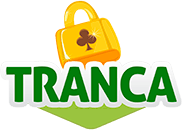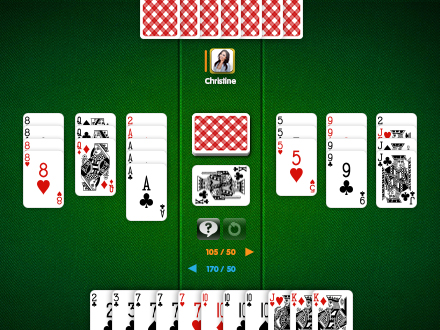Canasta Online
Play online canasta. Canasta is a card game for four (in partnerships), three or two players. Here you can play two-player canasta against other people worldwide. It is played with two standard. Canasta game featuring strong computer players and online multiplayer. 4-players and 2-players - Challenging computer players - Games with friends and rated games with players from all over the world - Options for the most popular rules variations - Advanced Statistics - Changing visuals to your taste - Landscape and portrait support It’s.
Flash Wilson's Canasta Tips
Don't know what to discard?
What are you saying?
The 'follow me' trick
Different types of player and strategy
Four player games
General tips:

- Always keep a record of what's in the discard pile. When playingonline, I have a small Wordpad window open to record the discards.The game can be too quick (and the pile too big) to remember withoutrecording it somewhere, and if you don't keep tabs on the discardpile you will be at a huge disadvantage.
- Remember that your opponent needs a certain number of points forthe initial meld (either 50, 90 or 120). I use the rule that in generalthey are unlikely to have 50 before turn 2, unlikely to have 90 before turn 5, and unlikely to have 120 before turn 7 (sooner if wild cardsare allowed in the opening meld). Therefore you can takeless care over what you discard in the early stages of the game. Itcan be useful to discard high singletons early on. Hold your 3s and 2sfor later in the hand when there is a risk of your opponent picking up.
- Don't lock the pack if neither of you have melded yet. There is no point - it simply stalls for one turn. Next time round your opponentmight pick up, and you've lost your valuable wild card!
- Watch for the draw pile running out - the game will end after theturn in which the last card is drawn, so meld before that happens! In a 4 player game, the draw pile runs out quite quickly and oftenbefore anyone has melded out.
- Don't be lured into feeding wild cards into a locked discard pile.You are only putting off the turn where you will have to play a cardwhich your opponent can pick up, and your wild cards are too valuableto lose, and can hand your opponent the game when he picks up. If I see the pack lock I tell myself I have no wilds, so I'm not tempted! If you are tempted (or worried that your opponent will meld outand leave you with a handful of high cards) why not use them to make Canastas, or to meld pairs? Think hard before being sucked into feedingwilds turn after turn. Do you really want what's in the discard pile,or is it just a few melds of low cards?
- There is little point in picking up a pile of just one cardunless it's a card you really need, e.g. to complete a Canasta andmeld out!
- Don't forget you can meld before drawing - you may not wish todraw if you can meld out on your existing cards.
- Hold onto your 2s as long as possible. However, they will hurtif you are stuck with them in your hand and your opponent melds out.If you have both 2s and jokers, meld the jokers first as theyare worth 50 points rather than 20 - painful if you have a handfulof them when your opponent goes out!Use them if you are close to melding out, or if your opponent hasany Canastas - otherwise they may be more use later on to meld a pair, and a 'natural' Canasta (with no wilds) is worth many morepoints and worth waiting for if possible.
Don't know what to discard?

- You can safely throw anything your opponent has already turned into a Canasta (though it can be useful to hold one back until you really need it)- they can't meld with these even if the discard pile isn't locked.
- In general, discard low cards (4-7) as they are only worth 5 pointseach and so the melds are worth little. They are also not much use when going for the opening meld as you need so many of them!
- In the first few turns of a hand, there is less of a risk so thismay be the time to discard a high singleton if required.
- Hold back your 3s as long as possible - you will be glad of themlater (and if not, you can meld 3 or 4 of them when you meld out)
- If your opponent has only one card in his hand and the pack is locked you can throw anything you like - he won't have a pair so can't pick up on it.
What are you saying?
Canasta For Four Players
- Throwing a 2 says 'I want this discard pile'. Beware of the messagesyou are giving your opponent - they may guess what you are holding, and will probably try to block you.
- Throwing a 3 says 'I don't want you to take this discard pile'. If there's a good meld in there (whether on its own or it fits withyour opponent's existing melds) that's ok - if not, you've probablyused your 3 too early.
- Making a Canasta or two shows you are thinking of going outand may lure your opponent into melding (whether you intend him to or not).
The 'follow me' trick
- Everyone uses this at some point! The idea is to persuade youropponent to throw something you can pick up on, especially if the packis locked.
- Decide what you can afford to throw away (leaving yourself at leasta pair of that card, and enough points to meld if necessary). Be prepared to lose the card.
- Make sure you don't choose a card that your opponent knows youhave others of - for example if they were in the discard pile last time you picked up. He's unlikely to have forgotten!
- Ideally there will already be one or two of this kind of card in the discard pile, so it looks more natural when you discard another one.This also reduces the odds of your opponent having enough of thiscard to pick up the pile himself.
- You can also be canny if you notice your opponent throwing awaythe same card time after time - if you get any, don't join in (hemay also be trying this trick) but hold them so you can pick up infuture.
- Hopefully your opponent will be lured into playing the same cardas you discarded - whereupon you pick up!
- If your opponent constantly 'has no discard' (i.e. has only onecard in his hand, but not enough Canastas to go out) then simply throwyourself a card which you can pick up on next time round.
Different types of player and strategy
There are many different strategies but surprisingly, many players tendto stick to one method. Good players will use all of these strategies as needed, rather than beingrestricted to one style of play. Here are some ideas to counter those strategies:
- The player who always locks the pack
- Don't get drawn into throwing your wilds away. Chances are thatin a few turns you will run out of wilds, he will pick up - and use those wilds to meld out
- Keep your 3s back as late as possible
- Count the cards in the discard pile carefully, and only throwcards that they are unlikely to have a pair of. Quite often there will be 6 or more of the same card in the discard pile
- Try the 'follow me' trick to get him to throw something you canpick up on
- Meld as little as possible, until he looks like he may win or there are only a few turns left before the draw pile runs out
- The player who tries to go out on his opening meld
- They often lock the pack and rarely pick up, but when they do theywin the hand, so meld as little as possible
- But do meld Canastas, and meld high cards like Aces and Jokers which will hurt if they are in your hand when your opponent melds out
- Meld cards you hold 5 or 6 of - keep a pair in your hand and onlymeld the others until you have Canasta
- Don't be afraid to make the first move - you may scare the opponent into melding before they are ready. Move when you are ready rather thanwhen you feel pressured into it
- Watch discards for odd patterns such as high cards or the same cardtwice in a row. The opponent may be trying to lose their singletons andodd pairs so they can meld out soon
- The player who always melds where possible
- This is the easiest player to defeat. Hold back your melds and thenwhen they have melded three or four different cards, lock the pack
- Don't feel pressurised into melding as much as possible too!
- Do very little - you can usually see when they are close to goingout and react at that point
Adapt your strategy to each player, and adjust it between hands so they can't work out your methodology. Keep one step ahead - if you are playingcatchup and feel forced into melding, or feeding wilds into a locked pack,stop and rationalise, then change tactic if you need to. A flexible playing style is most effective.
 Four player games
Four player gamesOnly tackle these when you are used to two player Canasta - it's harderto keep tabs on the discard pile and you have a partner who deserves a good game!
- As soon as you can make the opening meld, do so in order that yourpartner can play
- Usually you should lay down melds more quickly than in 2 player Canasta,so your partner can see what you have and meld their cards rather than discarding something you are collecting.
- However, keep a pair in hand if you can (just meld 3 of something youhave 5 or 6 of) in case the discard pile is locked.
- Remember the pack will run out much more quickly than in 2 playerCanasta - meld as much as you can before it happens!
- Don't add wild cards to melds (apart from on the opening meld ifappropriate) until your partner has had a chance to meld their cards.It may be that they can complete a Canasta for you.
- Picking up the discard pile is more important than in 2 player Canasta- you can often lock out one player but it's unlikely you can lock outboth opponents for long, and you may be disadvantaging your partner too.
- The hand ends when one player melds out. If you are ready to meld out,make sure your partner hasn't too many cards, or has a chance to guess thesituation and to meld before you do so.
- Try to remember what the player after you put down, as it is probably safe to throw the same thing in front of them next time.
Canasta Online Card Game
This page last updated: 30 January 2005Play Canasta Online With Friends
If you have a comment, please leave it in theguestbook.To contact Flash directly, completethis form.Like this site? Buy me a drink!
This site moved from a fixed width to the current layout in 2009. Some oldercontent such as photo sets may still have a fixed width. However if you notice any pages which are actually broken, please be kind enough to let me knowvia this form.
© Flash Wilson 1999-2010.I charge a fee for use of my photos.